“Public Diplomacy in the News” is a CPD Blog series by Andrew Dubbins that spotlights noteworthy stories on public diplomacy topics such as cultural diplomacy, nation branding, exchange programs, international...
KEEP READINGThe CPD Blog is intended to stimulate dialog among scholars and practitioners from around the world in the public diplomacy sphere. The opinions represented here are the authors' own and do not necessarily reflect CPD's views. For blogger guidelines, click here.

Public Diplomacy in the News: Beer Diplomacy, France's Diplomatic Reserve, & Russia's "Operation Overload"
“Public Diplomacy in the News” is a CPD Blog series by Andrew Dubbins that spotlights noteworthy stories on public diplomacy topics such as cultural diplomacy, nation branding, exchange programs, international events and conferences, digital diplomacy, and strategic global communications.
Czech Republic teaches the world to drink through beer diplomacy. The Czech Republic has embraced “beer diplomacy,” a soft-power initiative inviting foreign brewers to immerse themselves in its centuries-old beer culture and master the art of Czech-style lager. Since 2019, the Ministry of Agriculture has hosted annual summits where brewers from countries like the US, Canada, and Australia meet Czech brewers, farmers, and tap makers, learning traditional techniques and the cultural reverence for proper pouring and brewing. This strategy, inspired by Thailand’s “gastro-diplomacy,” aims to spread appreciation for authentic Czech beer abroad while sparking curiosity that draws drinkers back to its source.
France launches diplomatic reserve to boost soft power and aid citizens. France has launched a “diplomatic reserve” aimed at strengthening its soft power, countering disinformation, and improving support for citizens abroad, especially during crises. Open to French and European citizens over 18, the reserve will be divided into two groups: one made up of current and former Foreign Ministry staff, agency employees, and affiliated academics, and another of volunteers from NGOs, think tanks, business leaders, and technical experts, pending parliamentary approval. Foreign Minister Jean-Noël Barrot emphasized its role in assisting French nationals in emergencies, supporting international events, and enhancing France’s global image, with a goal of enrolling 1,000 reservists by year’s end, building on President Macron’s 2023 pledge to reform and modernize French diplomacy.
Pro-Russia disinformation campaign exploits AI to spread fake content. A pro-Russia disinformation campaign known as Operation Overload has dramatically escalated its output by exploiting freely available AI tools to produce and distribute fake videos, images, websites, and voice-cloned content aimed at fueling division on issues like Ukraine, immigration, and elections. Active since 2023 and linked to the Russian government, the campaign has shifted to scalable, multilingual tactics, generating hundreds of pieces of content each month and disseminating them via social media bots, Telegram channels, and even outreach to fact-checkers. Researchers found much of the material was created with tools like Flux AI and consumer-grade voice generators, enabling sophisticated impersonations and racist propaganda. Platforms like TikTok and Bluesky have removed many fake accounts, while others like X have done little to counter the operation, which continues to exploit the blurring line between authentic and AI-generated media.
Global leaders push development reforms as US skips UN summit. Global leaders gathered in Seville for the once-in-a-decade UN development summit to address mounting poverty, climate change, and stalled progress on sustainable development goals, despite a U.S. boycott led by President Trump. UN Secretary-General António Guterres and other leaders called for overhauling global financial systems to boost multilateral lending, provide debt relief, reform credit ratings, and mobilize private capital for poorer nations. Initial pledges included a new tax on private jets and first-class flights, and demands to loosen development banks’ credit constraints to meet urgent funding needs, while aid figures continued to decline globally.
David Latona, Simon Jessop and Marc Jones / Reuters
UNESCO and Jeju empower global youth through AI and cultural exchange. UNESCO and Jeju Special Self-Governing Province in South Korea launched the “Jeju Culture Global AI Art Class,” a three-year initiative blending Jeju’s cultural heritage with artificial intelligence to foster creativity and cross-cultural understanding among youth worldwide. In its 2025 program, 85 students from 11 countries participated in workshops, lectures, and exhibitions showcasing AI-driven art inspired by Jeju culture. The project culminated at the Jeju AI Global Film Festival, where experts, instructors, and students discussed the role of AI in arts education, cultural preservation, and diversity.
Visit CPD's Online Library
Explore CPD's vast online database featuring the latest books, articles, speeches and information on international organizations dedicated to public diplomacy.
POPULAR ARTICLES
-
January 29
-
January 20
-
December 17
-
January 28
-
December 15
Join the Conversation
Interested in contributing to the CPD Blog? We welcome your posts. Read our guidelines and find out how you can submit blogs and photo essays >.













